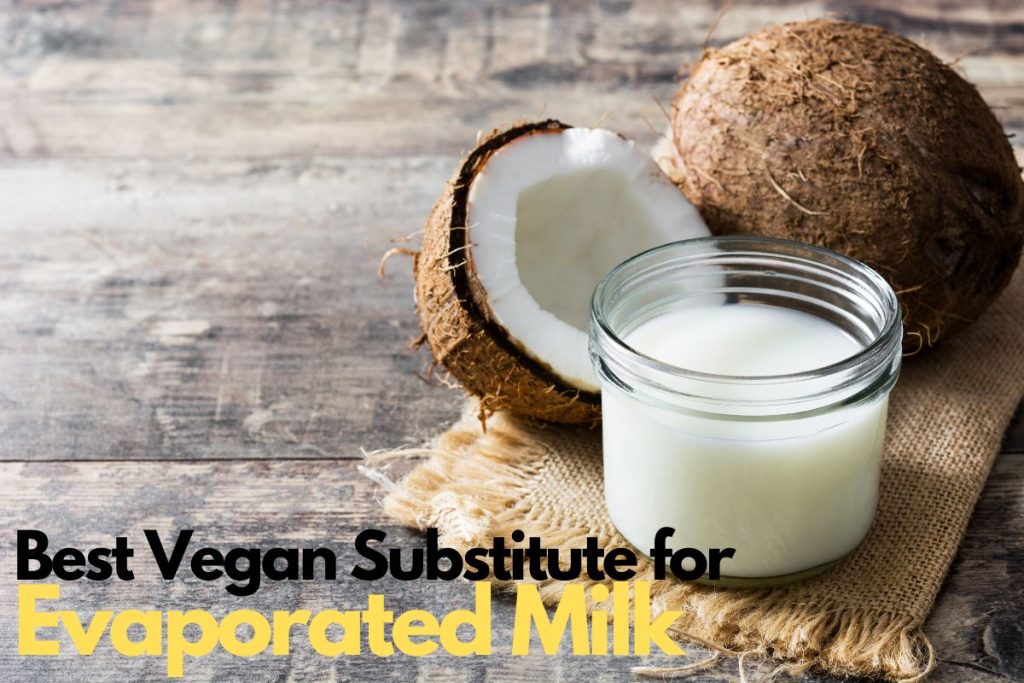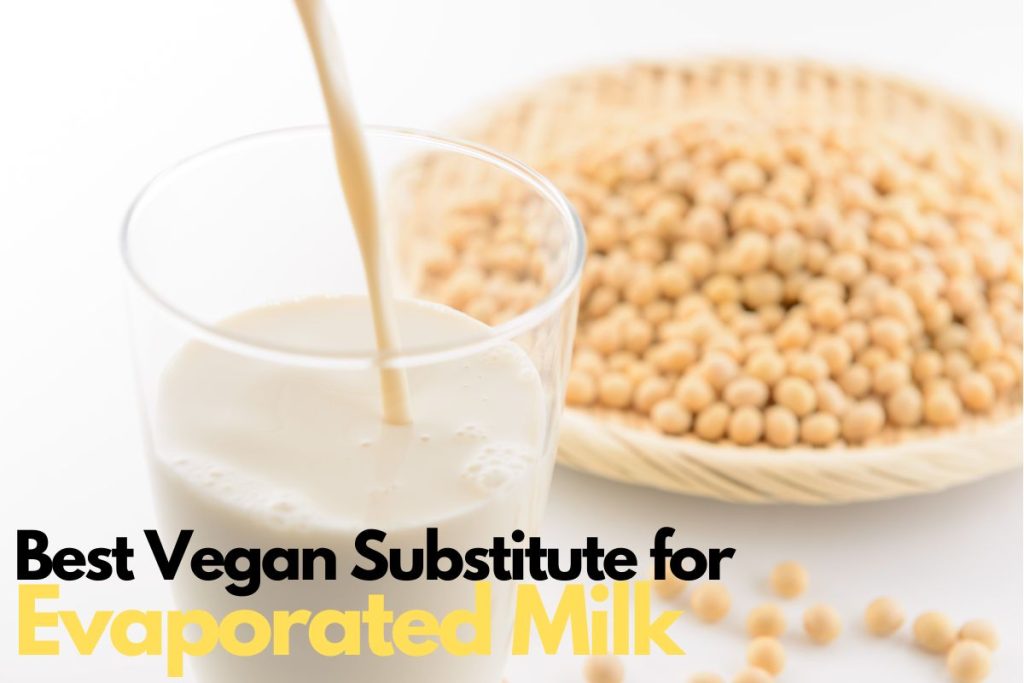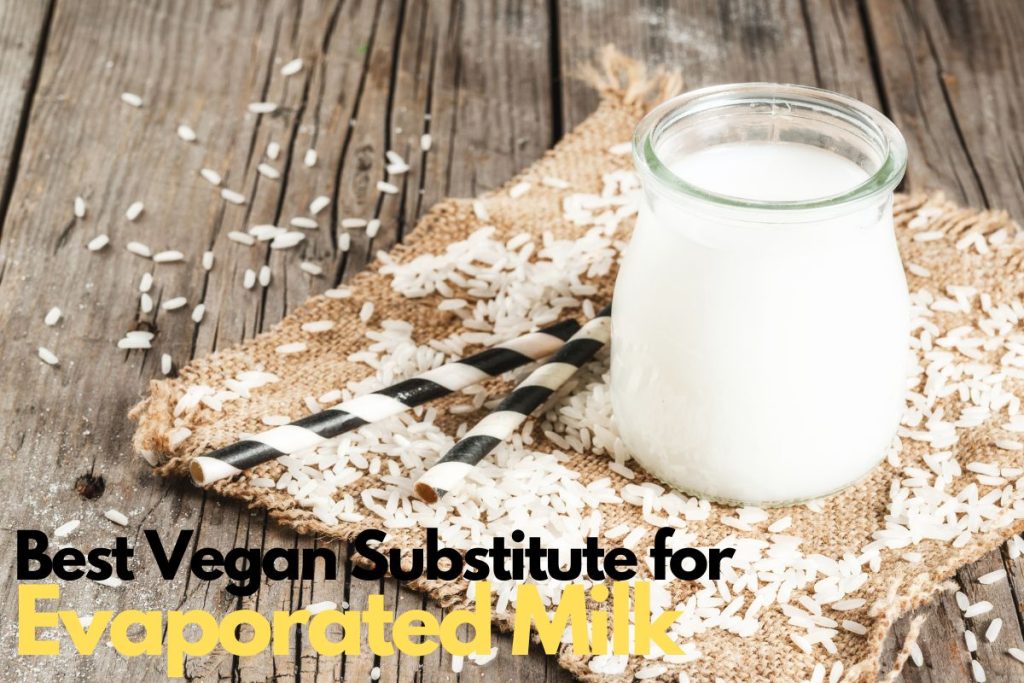In the world of vegan cooking and baking, finding the right substitutes for traditional dairy products is crucial. One such product is evaporated milk.
So, what’s the best vegan substitute for evaporated milk? To answer this question, we must first understand what evaporated milk is, why it’s used, and why a vegan might need to find a substitute.
What is Evaporated Milk?
Evaporated milk, also known as dehydrated milk, is a canned milk product in which about 60% of the water has been removed from fresh milk.
The process begins with homogenized milk, which is then heated until about 60% of its water content has evaporated.
The result is a concentrated, nutrient-dense product that has a longer shelf life than regular milk.
Evaporated milk is different from sweetened condensed milk, which is often confused with it.
While both are forms of concentrated milk, sweetened condensed milk has sugar added, which makes it thicker, sweeter, and not a suitable substitute for evaporated milk in most recipes.
The process of making evaporated milk was developed in the 19th century as a way to preserve milk without refrigeration.
Today, it’s appreciated for its versatility in cooking and baking, as well as its unique flavor and texture.
Common Uses of Evaporated Milk
Evaporated milk is commonly used in sweet and savory dishes alike. Its rich and creamy texture makes it a popular ingredient in recipes that require a creamy texture.
It’s often used in custards, puddings, pie fillings, and ice cream. In savory dishes, it’s used in creamy soups, sauces, and pasta dishes.
It can also be used in coffee and tea as a creamer.
One of the reasons evaporated milk is so popular in cooking and baking is that it can be used in high-heat applications without curdling.
This is due to its lower water content. When regular milk is heated, the water can evaporate, leaving behind milk solids that can curdle.
But because evaporated milk has already had much of its water removed, it’s less likely to curdle when heated.
In the next section, we’ll explore why someone might need to find a vegan substitute for evaporated milk, and we’ll discuss some of the best options available.
Why Look for Vegan Substitutes?
The rise of veganism in recent years has led to an increased demand for vegan substitutes for common ingredients.
People choose to follow a vegan diet for a variety of reasons. Some people choose veganism for ethical reasons, as they believe in not using animal products.
Others may choose a vegan diet for health reasons, as plant-based diets are often lower in saturated fat and cholesterol and higher in fiber.
Still, others may choose veganism for environmental reasons, as animal agriculture is a significant contributor to greenhouse gas emissions.
Regardless of the reason for choosing a vegan diet, one challenge that many vegans face is finding suitable substitutes for common non-vegan ingredients.
This is particularly true for dairy products, which are used in a wide variety of recipes. Evaporated milk, with its unique texture and cooking properties, can be particularly challenging to replace.
When looking for a vegan substitute for evaporated milk, there are a few key factors to consider.
First, the substitute should ideally have a similar consistency to evaporated milk. Evaporated milk is thicker and creamier than regular milk, so a good substitute should also have a rich, creamy texture.
Second, the substitute should behave similarly to evaporated milk when used in recipes. This means it should be able to withstand heat without curdling and should be able to blend well with other ingredients.
Finally, taste is a crucial factor. While it may be challenging to find a vegan substitute that perfectly replicates the taste of evaporated milk, a good substitute should have a neutral or slightly sweet flavor that won’t overpower the other ingredients in a recipe.
In the next section, we’ll explore some of the best vegan substitutes for evaporated milk, considering these factors.
Top Vegan Substitutes for Evaporated Milk
When it comes to vegan substitutes for evaporated milk, the best options are plant-based milks that have a naturally creamy texture.
However, it’s important to note that not all plant-based milks will behave the same way evaporated milk does in recipes, and some may alter the flavor of your dish.
Let’s explore some of the top contenders.
Coconut Milk

Coconut milk is a great vegan substitute for evaporated milk. It’s made from the flesh of mature coconuts and water, resulting in a thick, creamy liquid that’s rich in flavor.
Its consistency is similar to that of evaporated milk, making it a good option for many recipes.
In terms of cooking properties, coconut milk performs well under heat and can be used in a variety of sweet and savory dishes.
However, it does have a distinct coconut flavor that can come through in the final dish, so it’s best used in recipes where this flavor will complement the other ingredients.
Soy Milk

Soy milk is another good option. It’s made from soybeans and water, and it has a rich and creamy texture that’s similar to that of evaporated milk.
Its neutral flavor makes it a versatile substitute in a variety of recipes.
When using soy milk as a substitute for evaporated milk, it’s best to use unsweetened soy milk to avoid adding any unwanted sweetness to your dish.
Also, keep in mind that soy milk can curdle under high heat, so it’s best added to hot dishes at the end of cooking.
Almond Milk

Almond milk has a lighter texture than coconut and soy milk, but it can still be used as a substitute for evaporated milk in most recipes.
It’s made from ground almonds and water, and it has a slightly nutty flavor that can add an extra layer of depth to your dishes.
When using almond milk as a substitute for evaporated milk, opt for unsweetened almond milk to avoid adding extra sweetness to your dish.
Also, like soy milk, almond milk can curdle under high heat, so add it to hot dishes at the end of cooking.
Rice Milk

Rice milk is the thinnest of the vegan milk substitutes, but it can still work as a substitute for evaporated milk in recipes that don’t require a thick texture.
It’s made from milled rice and water, and it has a sweet, mild flavor that can complement a variety of dishes.
When using rice milk as a substitute for evaporated milk, choose unsweetened rice milk to avoid adding extra sweetness to your dish.
And, like soy and almond milk, add rice milk to hot dishes at the end of cooking to avoid curdling.
In the next section, we’ll provide some practical tips for cooking and baking with these vegan milk substitutes.
How to Use Vegan Substitutes in Recipes
Now that we’ve explored some of the best vegan substitutes for evaporated milk, let’s discuss how to use them in your recipes effectively.
Tips for Cooking and Baking with Vegan Milk Substitutes
When using vegan milk substitutes in recipes, it’s important to keep in mind that they may not behave exactly like evaporated milk.
For example, they may not thicken as much when heated. To achieve a thicker consistency, you can try reducing the milk substitute on the stove or adding a thickening agent like cornstarch or flour.
Here are some additional tips for cooking and baking with vegan milk substitutes:
Adjust the Quantity: You may need to adjust the quantity of the vegan milk substitute you use in your recipe. As a general rule, you can substitute vegan milk for evaporated milk in a 1:1 ratio.
However, because vegan milks can be thinner than evaporated milk, you may need to use more of them to achieve the same consistency.
Consider the Flavor: Each vegan milk substitute has its own unique flavor, which can affect the taste of your dish. For example, coconut milk has a distinct, sweet flavor that can complement certain dishes but may not work well in others.
Choose a vegan milk substitute that will enhance the flavors of your dish, rather than overpower them.
Watch the Heat: Some vegan milk substitutes, like soy milk and almond milk, can curdle when exposed to high heat.
To prevent this, you can add the milk substitute towards the end of the cooking process, or use a lower heat setting.
Experiment: Don’t be afraid to experiment with different vegan milk substitutes to find the one that works best for you.
Each one has its own unique properties and can bring something different to your dishes.
Final Thoughts:
Finding the best vegan substitute for evaporated milk may require some trial and error, but with the variety of plant-based milks available today, you’re sure to find one that works for your specific needs.
Whether you prefer the rich, creamy texture of coconut milk, the neutral flavor of soy milk, the slight nuttiness of almond milk, or the sweet, mild flavor of rice milk, there’s a vegan milk substitute out there for everyone.
Remember, the key to successful vegan cooking and baking is understanding the properties of your ingredients and how they interact with each other.
Vegan milk substitutes may not behave exactly like evaporated milk in recipes, but with a little knowledge and creativity, you can adapt your recipes and create delicious, vegan-friendly dishes.
Finally, keep in mind that the vegan movement is about more than just food. It’s a lifestyle choice that reflects a commitment to animal welfare, health, and environmental sustainability.
By choosing vegan substitutes for common ingredients like evaporated milk, you’re not only creating delicious food, but you’re also making a positive impact on the world.
So, the next time you’re whipping up a recipe that calls for evaporated milk, why not try a vegan substitute? You might be surprised by how easy it is to make the switch, and how delicious the results can be.
